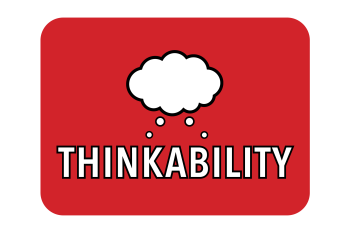
Thinkability
PUBLISHED:AUTHORS: Shari Tishman & David Perkins
Resource Summary
Interested in the connections between thinking and learning? Check out the new podcast series with Project Zero’s Shari Tishman and David Perkins. Through casual conversation, the series explores themes like curiosity, intuition, metacognition, and other related topics.
Thinkability is now on Spotify and Apple!
Season 4
Episode 1: Finding the Fun in Thinking
Where do you find your cognitive fun? Ok, you may not find the word “cognitive” all that funny, but chances are you find some thinking-centered fun somewhere. Maybe you like word games or solving puzzles; maybe you like thinking creatively with others, or working out mysteries, or envisioning imaginary worlds. Whatever your preferred flavors of cognitive fun, wouldn’t it be nice to find more of it? This episode takes a look inside the role of fun in thinking. Where do people find thinking-centered fun? (We took an informal poll.) What are the right conditions for having cognitive fun? How can we make thinking more fun? And how can we leverage the connection between thinking-centered fun and learning?
Episode 2: Sidewise: A New Book from David Perkins
Have you stepped sidewise recently? In our complicated world, a little bit of sidewise here and there could help any of us navigate better. In this episode, Shari interviews Dave about his new book, Sidewise: Unruly Rules of Thought and Action. Find out how a simple step to the side of our normal routines can nudge us towards “unruly rules” that help us think and act more effectively.
Episode 3: Perspective taking: It’s all in your point of view
Perspective taking is truly an amazing human capacity. It involves stepping outside of our present vantage point to try to perceive someone or something from a different point of view, and it figures endlessly in our lives. In the first of this two-part series, Shari and Dave look broadly at what perspective taking is, including the different forms it takes, and some of its inherent challenges. In Part Two, coming soon, they explore a variety of perspective taking strategies, focusing in on how we can foster better perspective taking in ourselves and others.
Episode 4: The Art of Perspective Taking
Perspective taking is the experience of stepping outside of our present vantage point to try to perceive someone or something from a different point of view. It’s easy enough to describe, but what does it look like in practice? How can we do it well? In this second Thinkability episode on the theme of perspective taking, Dave and Shari look at three different types of perspective-taking moves, and suggest some techniques we can use to get better at them. They also dig into some of the inherent challenges of perspective taking and offer a short set of questions that can help.
Season 3
Episode 1: Inquiry versus Advocacy
It’s a choice we make – inquiry versus advocacy, two very different styles of tackling an issue, each with its own methods, motives, and cost-benefit profile. Also, when viewpoints come our way, we can’t always recognize which approach is being taken and what to believe. Luckily, it’s possible to “surf” some of these complexities. In this episode, Shari interviews Dave on the topic of inquiry versus advocacy from his new book, Surfing on Quicksand, and together both explore our messy world of information, opinion, and spin.
Episode 2: The Power and Pleasure of Pause
When we talk about good thinking, we often point to highly purposeful attitudes and strategies like using thinking routines, taking an inquiry stance, or being actively metacognitive. But good thinking isn’t entirely a matter of strategic mental effort: There are moments when pausing in the midst of effort can be powerful and important. However, such moments pass us by all too easily. In this episode, Dave and Shari explore the power and pleasure of pause, with a special but not exclusive focus on the connection between pause and thinking.
Episode 3: How Complexity Hides
It’s no secret that the world is a complex place. But even though complexity seems to be all around us, it can also hide in surprising ways. This episode digs into the puzzle of hidden complexity by asking three questions: How does complexity hide? When should we go looking for it (or not)? What teachable techniques do we have for “un”-hiding complexity–that is, for uncovering and exploring it?
Episode 4: Surprise is a Gift of the Mind
Whatever a surprise feels like, it always signals a mismatch between expectations and what happened, and that's information...sometimes profoundly important information
Episode 5: Thinking Twice
When was the last time you told yourself, "I should've thought twice about that!"? Or the last time someone told you to think twice and you were glad of it? Thinking twice is powerful advice, and it may sound straightforward. But a look inside reveals several different purposes and pathways. This episode thinks twice about thinking twice: Why do we do it? When do we do it? And why should we care?
Season 2
Episode 1: Why Teach Thinking?
Shari and Dave open Season Two of Thinkability by revisiting a basic premise that underlies most of the Thinkability podcasts: the belief that it’s important to learn to think well, and that good thinking is teachable. They unpack this premise by asking what good thinking is, what it looks like in action, whether it’s really learnable, and what special messages about teaching thinking are especially relevant today
Episode 2: Teens and Screens
Thinking traps. Comparison quicksand. Friendship dilemmas and the pull of the screen. Drawing from their new book, Behind Their Screens: What Teens are facing (and Adults are Missing), Project Zero researchers Emily Weinstein and Carrie James offer a nuanced view of the digital dilemmas today’s teens face. They explain how teens’ thinking about life online is often much more complex than adults tend to assume, and they offer some potent and practical suggestions for how to support teens’ digital wellbeing. Along the way, they also invite us to probe some of our own assumptions about teens and social media.
Episode 3: Thinking Routines: What’s the Big Idea?
Thinking routines are streamlined strategies for fostering good thinking. They were originally developed at Project Zero a number of years ago and are now used widely in educational settings around the world. Maybe you already use them. If you do, you might have noticed that thinking routines are “sticky,” in the sense that they are invitingly easy and rewarding to use. This episode explores the big idea of thinking routines and the factors that make them so sticky.
Episode 4: Expansive Thinking
Expansive thinking happens when we push beyond what seems obvious, casting a wider net for ideas, questions, and perceptions. Should we do that all the time? No, who has the time! But much more often than we usually do. This episode explores the why, how, and when of expansive thinking.
Episode 5: The Power and Peril of Story
The power of story is all around us. Consider the pull of a great novel, the tug of political narratives, our personal and family stories, the stories of our communities and cultures. The peril of story is all around us, too. Consider stories based on misinformation or bias, polarizing stories meant to divide us, stories that do a poor job of explaining the world. This episode asks why stories can attract and inform us so well, and also how they can mislead.
Episode 6: Willpower and Will Wisdom
When was the last time you had to exercise your willpower? Maybe you were trying to push through a challenging task, or trying to resist a distraction or temptation. Whatever you were doing, if you're like most people, you may have found yourself wishing you had a little more willpower. But what is that ‘more?’ Is willpower a character trait? A kind of mental muscle? A set of strategies that can be learned and taught? This episode looks into our everyday conceptions of willpower, and also what researchers have discovered about how willpower works, and considers how we might move from the concept of willpower to the concept of will wisdom.
Season 1
Episode 1: What Good is Curiosity?
Curiosity is a learning superpower: If you have it, you will learn. But what is curiosity? Why do we have it, and how does it help us learn? What are some strategies for cultivating curiosity, and what are some obstacles? In this podcast, Shari and Dave chat about these questions and more, exploring what it is that makes curiosity so, well, curious.
Episode 2: Mighty Metacognition
Metacognition basically means thinking about your thinking. The idea has been popping up in education and business circles for years now. What we know about it from research and practice continues to grow. In this episode, Shari and Dave ask: What is metacognition and what makes it such a ‘mighty’ force in learning? How can it be developed in ourselves and others? And why is it especially important these days?
Episode 3: Enticing Intuition
Intuitions are an integral part of thinking. They help us make quick sense of the world, and we rely on them every day to solve problems, make decisions, navigate social situations, and more. The power of intuition is enticing, but sometimes intuitions can be misleading, causing us to miss important dimensions of a problem or situation. In this episode, Shari and Dave ask: What isintuition? Where can we see it in action? How can we get our intuitions to ‘speak’ to us, and when should we be wary about trusting them?
Episode 4: Thinking Dispositions Needed Now
Thinking dispositions are tendencies in our thinking behavior. The term often refers to tendencies like reasonableness, open-mindedness, curiosity, and other characteristics that push our thinking in positive directions. Like other aspects of character, thinking dispositions can grow and change over time, and they are susceptible to influence through context, culture, and education. Shari and Dave have been studying thinking dispositions for many years (ok, decades). In this episode they ask: What are thinking dispositions? Which thinking dispositions seem especially important these days? What are some promising ways to foster positive thinking dispositions —in ourselves, and in others around us?
Episode 5: Slow Looking
Slow looking means taking the time to look beyond a first glance. It is a simple move that can open the door to surprisingly powerful learning experiences. The topic is close to Shari’s heart, and in this episode, Dave mainly interviews Shari. He invites her to define slow looking, give examples of it in action, and explain how slow looking relates to thinking and learning. He also asks her about the basics of cultivating slow looking–in ourselves, and others. Along the way, Dave shares some of his own thoughts about the topic, which is close to his heart, too.
Episode 6: Understanding in Action
What does it mean to understand something? This seemingly straightforward question is at the heart of an inquiry that has been of interest to Dave for several years. In this episode, drawing on a long history of Project Zero work and following the format of the previous Thinkability episode, Shari interviews Dave. She explores his thoughts about three big questions: What is understanding? How do we know when we understand something? How can we foster the development of understanding–in ourselves and in those we teach? Along the way, Shari shares some of her own thoughts as well.
Follow the series on twitter: @ThinkabilityPZ



-
-
-
-
-
-
Support PZ's Reach